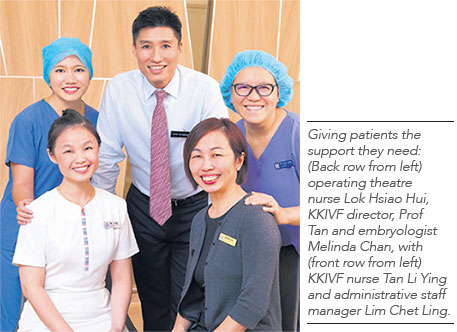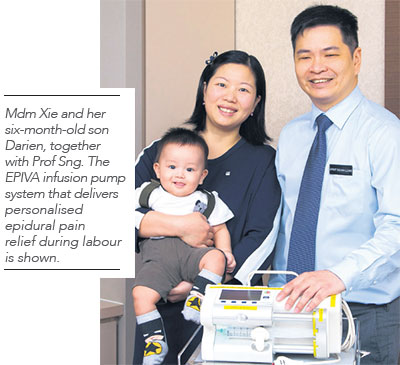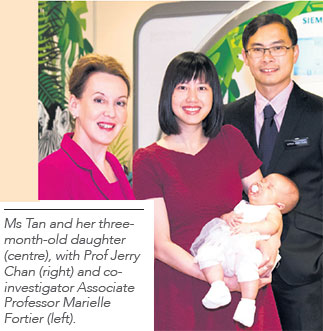Experts at KKH’s IVF Centre offer hope to couples wishing to conceive.
 The In-Vitro Fertilisation (IVF) Centre at KKH, or KKIVF, is one of the leading fertility centres in Singapore with a full suite of expertise to help couples to conceive.
The In-Vitro Fertilisation (IVF) Centre at KKH, or KKIVF, is one of the leading fertility centres in Singapore with a full suite of expertise to help couples to conceive.
According to Associate Professor Tan Heng Hao, director of KKIVF, spontaneous pregnancy is always encouraged and preferred, but in some, this may be challenging or not possible.
He explains: “Infertility is a relatively common problem, affecting at least one in eight couples at some time in their lives. The good news is that it can often be assessed and appropriately treated. It is important to seek medical attention.”
Patient-centric care
KKIVF has achieved consistent clinical pregnancy rates and safety profiles, comparable to internationally renowned centres.
“Drawing on the expertise of various medical and allied health specialties, KKH is able to provide holistic care for couples with a variety of medical conditions, and be a place of support for them.
In 2017, the hospital established the Recurrent Pregnancy Loss Clinic, which is run by specialists in reproductive medicine.
KKIVF since 2012
Ovarian Hyperstimulation Syndrome (OHSS) is a debilitating medical condition which occurs when too many ovarian follicles develop in response to medications.
Though uncommon, it can be potentially life threatening. KKIVF has reduced the incidence of OHSS and maintained it at a low rate.
Significant improvements have also been made in the laboratory culture environment. The formation rates of blastocysts (five-day-old embryos) are comparable to international standards.
Leveraging this, KKIVF has embarked on actively transferring a single blastocyst for selected patients to reduce the probability of multiple pregnancies — associated with higher risks for mother and baby — while improving implantation and pregnancy rates. Multiple pregnancy rates have been on a downward trend since, a positive outcome.
 A special delivery
A special delivery
To enable birthing mothers to receive more effective pain relief, KKH has developed a technology to customise the administration of epidural analgesia, known as the EPIVA infusion pump system.
EPIVA allows women in labour to determine the timing and frequency of their analgesic delivery, and self-administer the pain relief medication into the epidural space at the press of a button.
A clinical algorithm analyses the patient’s pain relief needs based on her on-going analgesic demands, and automatically adjusts the epidural maintenance rate accordingly to meet her pain relief requirements.
This worked for 34-year-old Madam Xie Xiaohong, whose pain was managed well enough for her to take a nap and watch television in the early stages of labour.
Being on EPIVA, Madam Xie was quite free of pain, and in control of when to administer more epidural medication — which helped her to remain calm throughout labour.
“Every year, about 5,000 women at KKH request for epidural pain relief for their childbirth pain,” says Associate Professor Sng Ban Leong, director of KK Research Centre and head of KKH’s Department of Women’s Anaesthesia.
“Innovations like the EPIVA system help ease the pain and anxiety of childbirth.”
 Enhancing health outcomes for every birth
Enhancing health outcomes for every birth
KKH is making strides on a pre-conception study to
investigate the link between the health of mothers
and that of their babies.
The S-PRESTO (Singapore pre-conception study
of long-term maternal and child outcomes) was
launched in June 2015 to examine how a woman’s
health, nutrition and mental state before pregnancy
will influence her subsequent pregnancy outcomes.
A collaboration between KKH, Singapore
Institute for Clinical Sciences (SICS) of the Agency
for Science, Technology and Research (A*Star),
and National University Health System (NUHS),
S-PRESTO is the latest in a line of studies from the
GUSTO (Growing Up in Singapore Towards healthy
Outcomes) birth cohort study.
Says Associate Professor Jerry Chan, Principal
Investigator, S-PRESTO and KKH Senior Consultant,
Department of Reproductive Medicine: “The
long-term goal is to develop effective approaches
that can help to prevent metabolic diseases —
ultimately enhancing health outcomes for every
birth.”
S-PRESTO study participant, Ms Tan Ying Ying,
29, mother of three-month-old Lara, shares this
long-term view, having decided to participate in
the study even before she got pregnant, to benefit
others, and generations into the future.
